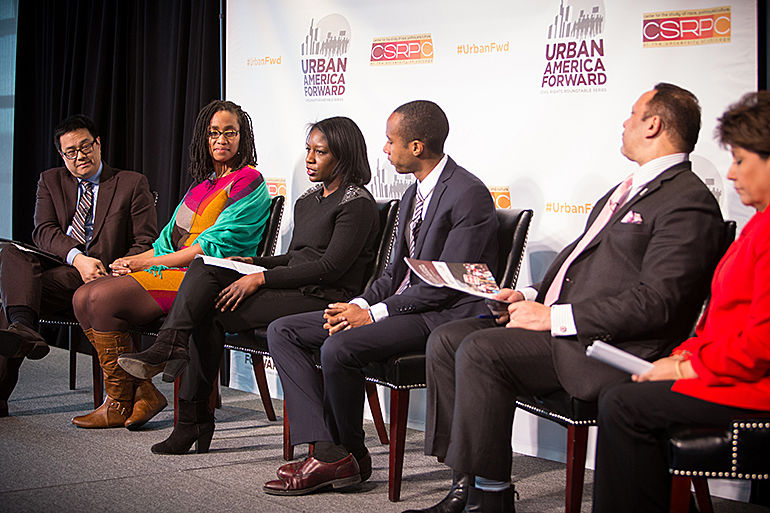Addressing the most pressing civil rights issues facing America will require intergenerational, interdisciplinary, and interracial collaboration, along with an evidence-based approach to policies that affect urban communities.
That was one conclusion of the Urban America Forward: Civil Rights national conference, which drew more than 150 civil rights activists, policymakers, foundation leaders, academics, and journalists to Washington, D.C., on March 4 to discuss an urban-focused civil rights agenda and a range of issues that included education, housing, healthcare, policing, and voting rights.
"The University's commitment to rigorous inquiry and evidence-based solutions is linked to our commitment to civic engagement and social impact." -Derek Douglas, vice president for civic engagement, University of Chicago
Moderated by Joy-Ann Reid, a national correspondent for MSNBC, the day-long conference, was the culmination of the 2015-2016 Urban America Forward civil rights roundtable series launched in June 2015 at the University of Chicago. The program captured policy solutions in an overview and 21 policy briefs on topics discussed throughout the series. The series and the conference were sponsored by the Center for the Study of Race, Politics, and Culture, with support from the Office of Civic Engagement.
Michael Dawson, director of the Center and MacArthur Professor of Political Science, noted that urban areas hold both promise and problems and that proposals coming out of Urban America Forward could form a foundation for more equitable policies.
 (From l to r): Don Chen, Ford Foundation; Micere Keels, UChicago Dept. of Comparative Human Development; Tasha Tucker, Atlantic Philanthropies; Malcom Glenn, Uber; Marc Morial, National Urban League; and Janet Murguia, National Council of LaRaza
(From l to r): Don Chen, Ford Foundation; Micere Keels, UChicago Dept. of Comparative Human Development; Tasha Tucker, Atlantic Philanthropies; Malcom Glenn, Uber; Marc Morial, National Urban League; and Janet Murguia, National Council of LaRaza
“Our cities are both our hope for our future and a concern for the present, as they face increasing tension, declining resources, the need for economic revitalization, and more just distribution of economic, political, and social benefits and resources,” Dawson said during opening remarks.
Conference speakers noted that people of color account for significant portions of urban populations and are disproportionately affected by these issues.
“Where you live is a proxy for opportunity,” said Angela Glover Blackwell, founder and chief executive officer of national research and advocacy organization PolicyLink, who spoke about the importance of equity and inclusion. “It determines whether you get to go to a good school, whether you live next to transportation that can connect you to a job.”
Micere Keels, associate professor in the Department of Comparative Human Development, noted that even in diverse urban neighborhoods, many schools are racially and economically segregated due to policies that enable more advantaged families to opt out of neighborhood schools.
 Angela Glover Blackwell, founder and CEO, PolicyLink
Angela Glover Blackwell, founder and CEO, PolicyLink
“The onus is on families and individuals for the educational outcomes that we get, rather than a framework that says every family and every child deserves a high-quality neighborhood school,” said Keels, who was part of a panel on education, housing and economic empowerment. “We are increasingly finding that this logic and this framework is not working (because) there are barriers to entry and to choice.”
Other UChicago panelists included Stacy Tessler Lindau, associate professor of obstetrics/gynecology and medicine and founder of NowPow LLC, who participated in a discussion about healthy communities, infrastructure, and the environment, and Craig Futterman, clinical professor at the University of Chicago Law School, who joined a discussion about justice, violence reduction, and police practice. Keels and Lindau were also among eight UChicago faculty members who authored or co-authored Urban America Forward policy briefs.
 Dwayne Proctor, director and senior advisor for Robert Wood Johnson Foundation, and Stacy Lindau, associate professor and director of research and innovation for UChicago Medicine Urban Health Initiaitve
Dwayne Proctor, director and senior advisor for Robert Wood Johnson Foundation, and Stacy Lindau, associate professor and director of research and innovation for UChicago Medicine Urban Health InitiaitvePanel discussions also covered topics such as the contraction of democracy, tomorrow’s urban civil rights coalition, and the role of the media in shifting the narrative about race and America. Throughout the conference, panelists expressed both frustration and optimism.
“What is exciting about this moment is that we have leaders emerging under the reality of our multicultural United States of America,” said Mee Moua, president and executive director of advocacy organization Asian Americans Advancing Justice, who was part of a panel on tomorrow’s urban civil rights coalition. “That kind of leadership is what we need to bring in the innovation and creativity” that reflect America and will take us into the future as we think about the civil rights agenda.
"Cities are both our hope for our future and a concern for the present." - Michael Dawson, CSRPC Director and MacArthur Professor of Political Science, University of Chicago
Derek Douglas, vice president for civic engagement at UChicago, said he looks forward to continuing the Urban America Forward discussions.
“The University’s commitment to rigorous inquiry and evidence-based solutions is linked to our commitment to civic engagement and social impact,” Douglas told conference attendees. “We hope you will help us keep the conversation and the work to find effective solutions going.”
Other conference speakers included representatives from the Advancement Project, BYP100, Equal Justice USA, Hip Hop Public Health, Leadership Conference on Civil and Human Rights, Mexican American Legal Defense and Education Fund, NAACP Legal Defense and Education Fund, National Council of La Raza, the National Urban League, Voto Latino, and We Charge Genocide, along with representatives from Google and Uber.
The Urban America Forward series was also supported by the Ford Foundation, W.K. Kellogg Foundation, Kresge Foundation, and Atlantic Philanthropies.
By Calmetta Coleman
Photos by Steve Canning
